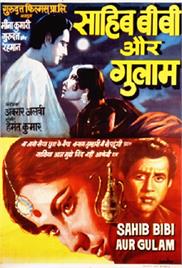Be Careful of Fake Websites. Always use HindiMovies.to domain & Join our Telegram Channel for Latest Updates.

Likes: 0
Views: 1.51K
A Zamindar neglects his wife and prefers the company of alcohol and dancing girls. The decadence of the Bangali Zamindar milieu and the raising bourgeoisie in the late 19th century, seen through the eyes of a young upward mobile rustic seeking fortune in Calcutta, and fascinated by the lady of the house…
Duration: 152 min
Released: 1963
IMDb Rating: 8.2/10 (770 Votes)
Genre: Drama, Hindi Movies, Musical
Stars: Guru Dutt, Rehman, Meena Kumari, Waheeda Rehman
Directors: Abrar Alvi
Writers: Abrar Alvi, Bimal Mitra
Year: 1962
Server 1 – Dailymotion
Watch Part 1
Watch Part 2
Watch Part 3
Watch Part 4
Server 2 – Dailymotion
Watch Part 1
Watch Part 2
Watch Part 3
Watch Part 4
Server 3 – Videoweed
Watch Part 1
Watch Part 2
Watch Part 3
Watch Part 4
Server 4 – Youtube
Sahib Bibi Aur Ghulam (1962): A Timeless Classic of Indian Cinema
Introduction
Released in 1962, Sahib Bibi Aur Ghulam is a quintessential classic of Hindi cinema, known for its poignant storytelling, soulful music, and memorable performances. This drama and musical film is widely regarded as one of the finest examples of Bollywood's golden era, touching upon themes of loneliness, societal decay, and the complexities of human relationships. Directed by the legendary Guru Dutt and featuring powerhouse performances from Meena Kumari, the movie remains an enduring masterpiece that continues to captivate audiences even decades after its release.
Plot Summary: What is the Movie About?
Sahib Bibi Aur Ghulam unfolds in the backdrop of late 19th century Bengal, a period characterized by the twilight of feudal aristocracy. The story is narrated through the eyes of a young man named Bhootnath (played by Guru Dutt), who arrives in a decaying zamindar's estate and becomes entangled in the lives of its inhabitants.
Bhootnath takes up the position of a servant (ghulam) in the household of the Sahib (the landlord) and his wife, Chhoti Bahu (played by Meena Kumari). Chhoti Bahu is a lonely, neglected wife, craving the love and attention of her often-absent husband, the Sahib (Rehman). The zamindar is a rigid, uptight figure who is increasingly alien to his wife and their surroundings as their family's fortunes decline.
The film delves deeply into Chhoti Bahu's struggle to keep her marriage alive by attempting to win back her husband's affection through the use of wine and other means, symbolizing her desperation and vulnerability. Meanwhile, Bhootnath's observations provide an outsider's perspective on the complex dynamics within the household, making the film a sympathetic study of fading aristocracy and the personal tragedies embedded within.
As the narrative progresses, the movie captures the twilight of a bygone era, where old values clash with new realities, and where individuals grapple with loneliness, unfulfilled desires, and societal expectations. The culmination is both heart-wrenching and poetic, rendering Sahib Bibi Aur Ghulam a profoundly emotional and insightful cinematic experience.
Main Actors and Performances
Director and Writer
The film was masterfully directed by Guru Dutt, one of Indian cinema's most talented and revered filmmakers. His direction captures the opulence and decline of the zamindar milieu with poetic visuals and rich symbolism. Guru Dutt's knack for visual storytelling, combined with his sensitivity towards the characters' emotional landscapes, elevates the film's narrative quality.
The screenplay was adapted by Abrar Alvi, who also co-wrote the script. Alvi's writing is meticulous and rich in character development, deftly translating the novel's narrative into a deeply emotional screenplay. The film is based on the Bengali novel "Saheb Bibi Golam" by Bimal Mitra, which serves as the foundation for the haunting tale.
Music and Songs
The music of Sahib Bibi Aur Ghulam was composed by the celebrated composer Hemant Kumar, with lyrics penned by Shakeel Badayuni. The film's soundtrack is an integral part of its emotional depth, featuring melodious and timeless songs that complement the narrative beautifully.
The songs are not merely interludes but act as narrative devices that intensify the characters' emotions, uplift the mood, or foretell impending tragedy. The melodious compositions and poetic lyrics have ensured that the music of Sahib Bibi Aur Ghulam remains evergreen.
Cultural Impact and Legacy
Sahib Bibi Aur Ghulam stands as a landmark film in Hindi cinema, noted both for its artistic excellence and its socio-cultural commentary. The movie sheds light on the changing status of women, the erosion of feudal values, and the emotional turmoil caused by isolation and neglect. Meena Kumari's portrayal of Chhoti Bahu became iconic and is frequently cited as one of the greatest female performances in Bollywood history.
At the National Film Awards, the movie won for Best Feature Film in Hindi, among other accolades. It was also India's official entry to the Academy Awards for Best Foreign Language Film, underscoring its critical acclaim and international recognition.
Over the years, the film has inspired numerous filmmakers and continues to be studied for its rich characterization, narrative technique, and memorable cinematic moments. It embodies the classic storytelling ethos that blends melodrama, realism, and lyrical beauty.
Conclusion
In summation, Sahib Bibi Aur Ghulam is not just a movie but an immersive experience into the heart and soul of a fading era. Under the visionary direction of Guru Dutt, enhanced by stellar performances—especially by Meena Kumari—an evocative screenplay by Abrar Alvi, and soul-stirring music by Hemant Kumar, it remains a timeless classic. This film invites viewers to reflect on the complexities of love, loneliness, tradition, and change, making it an essential watch for anyone interested in the rich tapestry of Indian cinema.